The truth about Nestlé's CSV initiative
Nestlé held its Creating Shared Value Global Forum in Colombia on Monday 28 October 2013, opened by the President of Colombia and Nestlé Chairman, Peter Brabeck-Letmathé.
As luck would have it, International Nestlé-Free Week started the same day, a time for people who boycott Nestlé over the way it pushes baby milk to do more to promote the boycott - and for those who don't boycott to give it a go.
Which meant that Nestlé's twitter feed from the Global Forum became a channel for exposing its marketing malpractice.
 Let Nestlé explain what it means by Creating Shared Value or CSV:
Let Nestlé explain what it means by Creating Shared Value or CSV:
"We believe that we can create value for our shareholders by doing business in ways that specifically help address global and local issues in the areas of nutrition, water and rural development. This is what we mean when we speak about Creating Shared Value."
Or as it put it on Twitter: "For a company to be successful over time and create value for shareholders, it must also create value for society".
The academic Michael E. Porter of Harvard Business School has developed the conceptual framework for CSV with Nestlé and promoted it to governments. His soundbite at the Global Forum: "When business can address social issues with a business model we have the magic."
The concept as sold to policy makers is that businesses have the organisational and innovative abilities to address social issues, whilst also having learned to operate in as efficient a way as possible to survive against their competitors and to make a profit for shareholders. So, the argument goes, if they can be brought into finding solutions for social problems, they will provide scalability: the more they do, the more profit they make, the more profit they make, the more they can invest to roll out the solution further. That is the magic.
The alternative of publicly funded or non-profit interventions cannot be sustainable, Michael E. Porter says, because the more successful they are, the more money required to spread that success.
This may be an appealing argument for policy makers, particularly when many are unwilling to meet their existing commitments to UN programmes and development targets. More so still, in an age of austerity resulting from the global financial crisis. But there are some fundamental conflicts in using a partnership approach to address certain social issues where the same corporations are implicated in causing harm. When Nestlé is an advocate, alarm bells should be ringing to say look a little more closley.
The more I listened to the webcast from Nestlé's Global Forum, the more absurd the situation became: Nestlé, the world's leading junk food company and pusher of baby milk, shamelessly attempting to steal the agenda on development, nutrition and water.
Nestlé violates the baby milk marketing code
The panellists Nestlé had invited discussed various problems such as undernutrition and obesity, the twin faces of malnutrition (in the sense of poor or inadequate diets, not just lack of food). Among them was Ann Veneman, who Nestlé billed as "ex UNICEF Executive Director", while she has been a member of Nestlé's board since 2011.
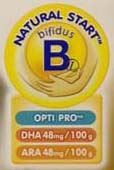
Ann Veneman said at the time of her appointment that she would work from within Nestlé to stop violations of the International Code of Marketing of Breastmilk Substitutes and subsequent, relevant Resolutions of the World Health Assembly. But she had not a word to say on the matter at the Global Forum. Nor has she stopped practices such as the idealising logos Nestlé uses to promote its formula (current example from Thailand shown left).
UNICEF distanced itself from its former Director's appointment to the Nestlé Board at the time, telling Reuters in 2011, "Ms. Veneman left UNICEF nearly a year ago and is now a private individual. UNICEF would not presume to comment on any personal choices." A UNICEF spokesman adds in the Reuter's report, "I can confirm that UNICEF does not take funding from Nestle. I can also confirm that Nestle violates the code."
The Nestlé CEO, Paul Bulcke, said at the Global Forum that Nestlé wants to be seen as part of the solution to social problems. Yet in too many areas Nestlé is part of the problem, from forcing down coffee prices and contributing to over-supply, to appropriating community water supplies, to contributing to the unnecessary death and suffering of infants by undermining breastfeeding.
Nestlé's underlying intention is making money for investors
The overarching concern of Nestlé executives is the long-term survival of the company and maximising shareholder value. Nestlé Chairman, Peter Brabeck-Letmathé, is very open about this, having attacked those who practice philanthropy with company funds as misusing shareholder money. Everything Brabeck does - even when it is sponsorship of good causes - has to benefit Nestlé and his shareholders. He even referred back to a speech he gave in Boston in 2005 which shocked some business leaders for suggesting, "companies should only pursue charitable endeavors with an underlying intention of making money for investors".
Mr Brabeck's genius is dressing up what is good for Nestlé as being good for society, while gaining access to policy makers to realise his goals.
Creating Shared Value is the Emperor's new clothes put on by Mr Brabeck and Mr Bulcke. When you understand their mindset, then you can see through it.
In fact, the self-serving nature of CSV was evident in the discourse at the Global Forum, in amongst the statistics of fortified meals provided, children trained on nutrition, litres of water saved and so on (which are not all they first appear, in any case).
"Milk and Murder"
Mr Brabeck opened proceedings by explaining that at its very beginning Nestlé was addressing social problems as its founder, Henri Nestlé, found infant mortality of 148/1000 when he emigrated to Switzerland and created the first "infant formula" so, Mr Brabeck said, "saving millions of lives".
In fact Nestlé was promoting farine lactee and later sweetened condensed milk for infant feeding, both unsuitable products for newborns. Dr Cicely Williams spoke on the impact in her 1939 talk "Milk and Murder" in which she describes the "massacre of the innocents". At that time Nestlé was promoting sweetened condensed milk as "the food par excellence for delicate infants". Dr Williams said:
"If you are legal purists you may wish me to change the title of this address to Milk and Manslaughter. But if your lives were embittered as mine is, by seeing day after day this massacre of the innocents by unsuitable feeding, then I believe you would feel as I do that misguided propaganda on infant feeding should be punished as the most miserable form of sedition, and that these deaths should be regarded as murder..."
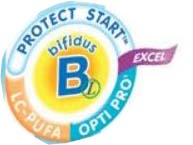 For Mr Brabeck to take that history and imply that the fall in infant mortality that occurred in the 20th century was due to Nestlé should be shocking, but it is totally in keeping with the marketing strategies he pursues today: promoting Nestlé formula with the claim it "protects" babies.
For Mr Brabeck to take that history and imply that the fall in infant mortality that occurred in the 20th century was due to Nestlé should be shocking, but it is totally in keeping with the marketing strategies he pursues today: promoting Nestlé formula with the claim it "protects" babies.
While "infant formula" today is very different to farine lactee, it remains the case that babies fed on it are more likely to become sick than breastfed babies and, in conditions of poverty, more likely to die.
Baby Milk Action has directly asked Mr Brabeck in writing and at the Nestlé shareholder meeting to stop claiming formula "protects" babies and other practices that violate international marketing requirements. Instead, Nestlé has boasted that its logos have been added to products in 120 countries.
What Nestlé says and what Nestlé does
Nestlé says today: "there is no question about breast milk being the best start a baby can have in life" and claims to abide by the World Health Assembly marketing requirements for breastmilk substitutes.
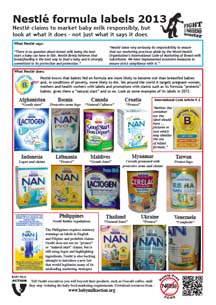 What Nestlé says and what Nestlé does are two different things, as our poster on Nestlé's current formula labels demonstrates - click here to download.
What Nestlé says and what Nestlé does are two different things, as our poster on Nestlé's current formula labels demonstrates - click here to download.
Nestlé also uses a range of marketing techniques to target pregnant women, mothers and health workers in ways that violate the Code and Resolutions, measures introduced following the exposure of the baby killer scandal in the 1970s.
Nestlé had Rob Black, co-author of a paper in a recent authoritative Lancet study, at the Global Forum to extol the importance of breastfeeding.
Mr Brabeck and Mr Bulcke sat there in silence in the full knowledge of the marketing strategies they employ that undermine breastfeeding.
Things like its "natural start" logo, with the carefully designed embracing arms (highlighted on our poster) are not there by accident or some rogue staff member, but because of Nestlé organisational and innovative abilities.
I directly asked Mr Brabeck from the floor of the Nestlé shareholder meeting to respect international marketing standards and remove Nestlé's "protect" logos from labels. I sked him to stop other violations, such as targeting health workers in India with sponsored events, which the Indian Government has specifically confirmed breaks its Infant Milk Substitutes Law.
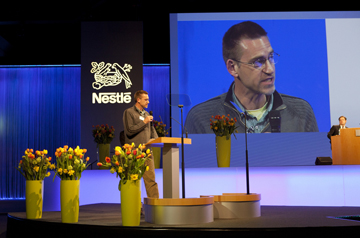
Mr Brabeck's response? "It is not for Baby Milk Action to tell me what to do."
What's good for Nestlé isn't good for health
At the shareholder meetings, Nestlé boasts of the profitability of its infant nutrition business. When Mr Bulcke replaced Mr Brabeck as CEO the impressive growth in infant nutrition he had achieved in the infant nutrition sector in Latin America was highlighted to shareholders.
It was a coup for Nestlé to have the President of Colombia present at the Global Forum, but also illistrative of how the CSV strategy works.
President Santos arrived with Mr Brabeck and his closing remarks before leaving were that he wanted to promote free trade in Latin America so that Colombia could become a major milk exporter, like New Zealand, and he looked forward to working together with Nestlé in this area.
The comparison with New Zealand was telling. President Santos said had received advice from the country. Where will this lead? New Zealand’s Economic Development Minister Gerry Brownlee stated in October 2010: "A kilo of infant formula is worth ten times the value of a kilo of milk powder, so it’s obvious which product New Zealand should be selling."
Formula from New Zealand increasingly goes to China, where marketing has few restrictions and breastfeeding rates are falling. This is a marked contrast to India where marketing is regulated and sales are static, as the graph below from a recent Save the Children report demonstrates.

This is the CSV strategy in action. Nestlé forges closer links with the President of Colombia for increasing milk exports. Nestlé shareholders will profit. Colombia will develop an industry. But at what cost to infant health?
The fundamental flaw running through CSV
The business magic extolled by Michael E. Porter presupposes there is a profit to be made from addressing social issues, or that society can be engineered to provide one.
In the area of infant feeding, profit lies in selling breastmilk substitutes and processed baby foods. Breastmilk is the most sustainable, locally delivered, tailored foodstuff there is, but profit is made by replacing it with a polluting, transported, processed food of inferior quality, leading to poorer health outcomes and environmental costs.
A new Lancet study cited by the World Health Organisation suggests that improved breastfeeding rates would prevent over 800,000 under-5 deaths every year, or 11.6% of all under-5 deaths.
Our partners in the Breastfeeding Protection Network of India recently published an analysis of how much funding it would take to save these lives by "scaling up breastfeeding". This involves spending money, but will ultimately cut health care costs. Sick babies require treatment. While 800,000 babies die every year, many more are admitted to hospital (improved access to health care has reduced the number dying from the 1.5 million annual deaths previously attributed to inadequate breastfeeding).
Even in the UK, UNICEF has estimated a modest increase in breastfeeding rates would save the National Health Service £40 million per year from a reduction in the five diseases most prevalent in babies fed on formula and prevent tens of thousands of hospital admissions.
Nestlé boasts of investing in breastfeeding promotion, but its true intentions are revealed by its infant nutrition growth target of 6% per year and the practices it employs to push its formula. Breastfeeding promotion serves to promote its infant nutrition business and build links to consumers and health workers.
The true meaning of Nestlé's CSV
CSV is partly a public relations exercise in diverting criticism. Our report Nestlé's Creative Storytelling Venture analyses what Nestlé does and doesn't say in its CSV reports.
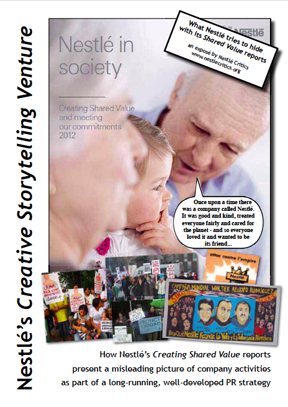 Events like the CSV Global Forum are about Nestlé stealing the development, nutrition and water agenda. Its strategy for alleviating poverty is to provide employment to people in supplying and selling its products by growing its markets. Its strategy for combating the rise in obesity from people eating its products is to put the onus on customers to read the nutrition information and to do more exercise. It encourages more exercise by sponsoring schools sports, linking this to product promotion to increase sales of products such as Milo (which is 46% sugar).
Events like the CSV Global Forum are about Nestlé stealing the development, nutrition and water agenda. Its strategy for alleviating poverty is to provide employment to people in supplying and selling its products by growing its markets. Its strategy for combating the rise in obesity from people eating its products is to put the onus on customers to read the nutrition information and to do more exercise. It encourages more exercise by sponsoring schools sports, linking this to product promotion to increase sales of products such as Milo (which is 46% sugar).
The CSV world is one where a buck has to be made and any problems created from doing so are to be addressed with strategies to make even more money for corporations and their shareholders.
The focus is on making money, not on solving the underlying problems, because sometimes corporations such as Nestlé are the underlying problem.
That is the true meaning of Nestlé's CSV: appropriating concerns about social issues to make money for executives and shareholders.
What was it Michael E. Porter said? "When business can address social issues with a business model we have the magic."
By promoting partnerships with business as a win-win approach, Nestlé aims to divert attention from the fact that it contributes to many of these problems. This is not only due to the way it markets its baby foods and other products. Every area needs to be scrutinised - see the Nestlé Critics website. Nestlé is accused of appropriating community water supplies. It is accused of forcing thousands of small farmers out of the coffee and dairy industries through procurement practices that encourage consolidation. It has encouraged land to be given over to coffee production in Vietnam and China, boasting of the employment created, and then blames the low prices paid to coffee farmers on global oversupply.
When policy makers and civil society point out harmful practices, regulation is derailed through promises of voluntary action, as with the promised reformulation of product recipes to make them "healthier" cited at the Global Forum.

In the UK, Nestlé signed a commitment last week to reduce fat in KitKat, its biggest selling confectionery product. A KitKat is 50% sugar and promoted heavily, most recently through Google's Adroid KitKat smartphone operating system. Sugar levels won't be reduced. But then it is chocolate and not a health food. Nestlé can sell it - and people can support our boycott of it.
What is questionable is when a peddler of unhealthy foods presents itself as a health, nutrition and wellness company and attempts to divert attention from how its marketing strategies contribute to problems such as obesity by hosting an international Global Forum to point fingers at others.
Running a business is not a bad thing to do. Companies provide employment, goods and services and some of them pay their fair share of taxes. They have a role to play, but that role should be decided by society, not by corporations using their influence with policy makers to set the agenda. Particularly corporations as self-serving as Nestlé.
Governments should govern and corporations should follow the rules
This is the title of an article I wrote with Patti Rundall for the UN System Standing Committee on Nutrition journal - SCN News. We argue that health policy should be made in the public interest. Certainly corporations should be consulted and have a right to give their views in a transparent way, as others should also be able to do. But it should be a consultation, not a negotiation. A negotiation implies compromising health to what corporations are prepared to accept.
When the Pharmaceutical companies opposed baby food regulations in the Philippines in 2007, the Supreme Court defended the regulations stating: "The framers of the constitution were well aware that trade must be subjected to some form of regulation for the public good. Public interest must be upheld over business interests."
The regulations stood.
That is not the end of that particular battle. Today Nestlé is working to have them replaced by a much narrower law that will remove much of the protection they provide.
You can hold companies to account
With policy makers being courted by Nestlé, it falls to we, the people, to hold companies to account.
In the case of Nestlé, pressure from the boycott has prompted changes. So why not send a message to Nestlé right now calling on it to remove its "protect" and "natural start" claims from formula labels and to abide by the marketing requirements? It will only take a minute or so. If you've read this far, surely you can spare another minute.
- Webmaster's blog
- Login to post comments






